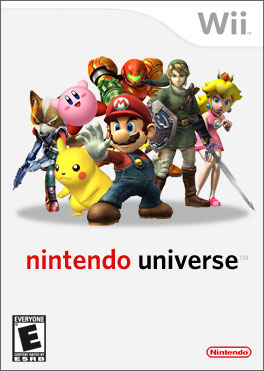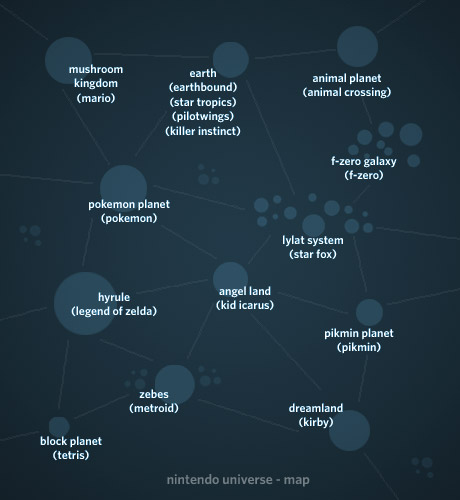Nintendo Universe: The Game I Would Love To Play In 10 Years
 Nintendo is a company of icons. Mario. Zelda. Pokemon. Donkey Kong. Kirby. Star Fox. And so on and so on. Fans have tremendous loyalty to these guys. Over the past few decades, these franchises have matured and expanded as technology has allowed them to do more. This creates a unique experience unparalleled by other forms of entertainment. We've grown up with them. For those of us who have been playing since the 8-bit NES days, half the fun of Nintendo games is the nostalgia factor. Mario used to be a collection of blocky pixels with heavily compressed bleeps and bloops - now he's a full 3D personality with symphonic accompaniments.
Nintendo is a company of icons. Mario. Zelda. Pokemon. Donkey Kong. Kirby. Star Fox. And so on and so on. Fans have tremendous loyalty to these guys. Over the past few decades, these franchises have matured and expanded as technology has allowed them to do more. This creates a unique experience unparalleled by other forms of entertainment. We've grown up with them. For those of us who have been playing since the 8-bit NES days, half the fun of Nintendo games is the nostalgia factor. Mario used to be a collection of blocky pixels with heavily compressed bleeps and bloops - now he's a full 3D personality with symphonic accompaniments.
Playing through that evolution throughout the years has been pretty amazing. One area that Nintendo has been somewhat more reluctant than others to explore, however, is online gaming. Most multiplayer Nintendo games require everyone to play together in the same room, sharing one console and one TV screen. While it's certainly fun in its own right (Mario Kart battle modes, Wii Sports), it's also fairly limiting, and not always the most convenient solution.
What if Nintendo fully embraced online gaming? We're beginning to see small footsteps with the DS and Wii. But if Nintendo ever wholeheartedly tackled this area one day, Nintendo Universe is the rough idea of a game I would love to see them make.
Nintendo Universe would be an MMORPG (massively multiplayer online role-playing game) where thousands of people could play together simultaneously. You would be able to start your adventure from a variety of locations - from Mario's Mushroom Kingdom, to Star Fox's Lylat System, to Earthbound's Planet Earth. Starting off, you would create a customized character based on the attributes from that game's world. So in the Mushroom Kingdom, you could choose to be a human (like Mario / Luigi / Princess), dinosaur (Yoshi), mushroom (Toad), koopa (Bowser), or whatever, and modify the look and feel to create a new inhabitant in that particular world. That way, instead of 100 Mario clones running around, you would have a wide variety of new characters - of all shapes and sizes and species - who feel like they belong in the Nintendo family. The perspective would be a third-person view, similar to the latest Legend of Zelda and Mario installments. The in-game interface would take several cues from Zelda, such as a life bar of hearts and a backpack of special items you collect along the way. 
Each planet would have its own set of problems and adventures to complete, and bring the stories and worlds from past games together for a complete sense of history and physical scale. So you might start out behind the castle walls of the Mushroom Kingdom, but pretty soon you would be exploring underground pipe mazes, Delfino and Yoshi islands, the Mario Kart racetracks, and even the distant Donkey Kong Isles and Subcon from SMB2. Transportation across the planet might include riding a go-kart, the back of Yoshi, or one of the airships from SMB3. Having a coherent and engaging story that connects 20+ years of Mario would be challenging, but could bring the history to life in fresh and interesting new ways.
Or maybe you decide to start as an angel from Kid Icarus' skies. Or a hovercraft pilot from F-Zero's galaxy. A bounty hunter or chozo from Metroid, a panda from Animal Crossing, or just a kid from Earthbound. Each beginning would have a different place of origin, with different adventures and problems to solve, all using slightly modified versions of the time-tested Zelda gameplay formula. Eventually, your character would complete most of the goals in their home world, and gain the ability to travel to another nearby planet. In keeping with the Mario example, our custom Mushroom Kingdom hero might discover Star Road from Super Mario World later on in his journey, and be warped over to planet Corneria from the Star Fox series.
Now things get interesting. You become a stranger in a foreign land, and the rules are different. Maybe your specific set of items and abilities aren't as useful here, or maybe they help you do things that the normal inhabitants couldn't do. Suddenly you're faced with a new set of adventures and areas to explore - and some might require you to backtrack between planets (maybe you need to go back and enlist Donkey Kong's help to climb up some scaffolding). And maybe there are planets where the atmosphere limits the type of inhabitants; a Mario-esque character might not be able to travel everywhere that a Samus Aran-esque one can. There would need to be a sense of balance between the planets, so the most powerful character in one setting might find himself at the bottom of the pack elsewhere.
The multiplayer element would make the universe seem alive at any given time. Players from different species and planets could team up to help each other complete certain tasks, or compete against each other in search of rare items. You could even compete in simplified multiplayer matches of the local customs on each planet - events like Pokemon battles, Mario Kart races, or Tetris face-offs. You could barter items with other players, and exchange your currency for local money (the gold coin / rupee conversion rate might fluctuate with time).
The increasing focus in this industry on user-generated content should play an important role as well. User creativity could push the universe into unexpected and beautiful new directions. Your character could build a home using local planet materials, and have a physical location for friends and family to visit, a la Animal Crossing. But instead of being only a glorified 3D chat program like many current virtual worlds, homes should serve a greater gameplay purpose. Maybe that means there are hidden pipes and tunnels under a piece of land, or invisible blocks and beanstalks above it. You might be able to access and play Wii-like virtual console games in your living room. Neighborhoods could group together so you and your friends would have the ability to make rules or laws in a shared common area.
I know, I know. This would be a massive undertaking. The ideal size of a Nintendo Universe game would be probably more than 10 Zelda games combined, and each of those games take several years to put together. There are ways around this, though. Shorter development cycles are now possible with digital distribution - the initial release may only have three planets, and a couple of new planets could be added each year as expansion sets, gradually building the overall storyline. Future standalone games could even be worked into the universe ecosystem as portals. An inevitable future Mario Kart game could have a special location in the Mushroom Kingdom - say, an enormous stadium - that might serve as a lobby for multiplayer matches of people who own the game, or a point of purchase for non-owners. Imagine if in 10-15 years, an entire generation of new games began within this universe structure, and the central storyline came to a conclusion at the end of the console's life cycle.
So there it is. An admittedly underdeveloped idea that has been cooking in my imagination for quite some time now. It would definitely be a lot of uncharted territory for Nintendo, and a lot of questions and challenges remain. All I know is that I would love to play this. As an innovative leader and developer behind some of the best video games ever created, I don't think it's impossible to dream that Nintendo can build a universe.
Thursday, May 3 at 5:32 PM
![]()
![]()
Okay Samurai Multimedia is Dave Werner's personal site. I'm currently working at Minor Studios in San Francisco. Thanks for visiting! (more...)
![]()
Okay Samurai Journal (Subscribe RSS / XML)
Dave Werner's Portfolio (okaydave.com)
Archives (Cardboard Box)
Contact (Mailbox)
![]()
![]()
My Videos on Vimeo
My Photos on Flickr
![]()
Lars Amhoff: Kinkyform Design
Colin Anawaty: Cubed Companies
Chuck Anderson: NoPattern
Haik Avanian: HaikAvanian.com
James Bailey: The Kingdom of Sad Machines
Ben Barry: CarbonFour / Forced Connections
Dimitry Bentsionov: Arthero
Joshua Blankenship: JoshuaBlankenship.com
Casey Britt: CaseyBritt.com
Duncan Brook: Superfreaky Memories
Matthew Burtner: Burtner.net
Jeff Chin: JeffChin.com
Mary Campbell: Mary Campbell Design
Sarah Coffman: Minus Five
John Contino: drawings&co
Angie Cosimano: Angie Unit
Chris and Linda Doherty: Citizen Studio
Anne Elser: Annepages
Neil Epstein: Mediafactured
Bjorn Fagerholm: 3jorn
Dave Foster: Dave the Designer
Justin Genovese: JustinGenovese.com
J Grossen: Sugarcoma Labs
Audrey Gould: Aud's Blog
Greg Hackett: GregHackett.com
Sam Harrison: Zingzone
Todd Hammell: Solid Colors
Leon Henderson: LHJ Photo
Howard Hill: Fascination Streak
Peter Hobbs: Peter Hobbs Photography
Matt Ipcar: Ipcar Design
Michael Johnson: Michael J Rox
Melissa Jun: MelissaJun.com
Jiae Kim: Theme magazine
Zack Klein: ZackKlein.com
Katie Kosma: Flying Conundrum
Peter Lada: Proxima Labs
Josh Levin: Nothing Learned
Larry Luk: Epidemik Coalition
Mike Mates: Urban Influence
Alison Matheny: Life of a Harpy
Turi McKinley: Turi Travels
Alaa-Eddine Mendili: Furax
John Nack: John Nack on Adobe
Allen Orr: Anthem In
Scott Paterson: sgp7
Joe Peng: MacConcierge
Paavo Perkele: Astudios
Brian Perozo: Ephekto
Jason Puckett: Everyday Puck
Kate Ranson-Walsh: Thinkradical
Tania Rochelle: Stone's Colossal Dream
Angela Sailo: Peanut Butter Toast
Mohit SantRam: Santram.net
Dan Savage: Something Savage
Kevin Scarbrough: Thin Black Glasses
Scott Schiller: Schillmania
Jason Severs: JasonSevers.com
Anthony Sheret: Work By Lunch
Nick Skyles: Boats and Stars
Sujay Thomas: iSujay
Joe Tobens: JospehTobens.com
David Ulevitch: Substantiated.info
John Verhine: Verhine.com
Armin Vit: Under Consideration
Ian Wharton: IanWharton.com
Roger Wong: One Great Monkey
Clay Yount: Rob and Elliot Comics
Jack Zerby: Jack Zerby Music